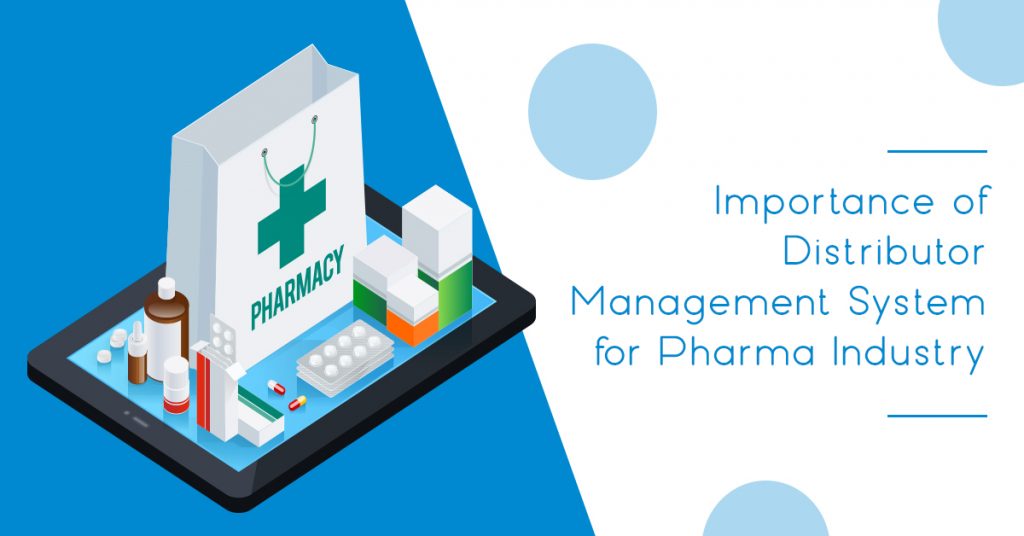Importance of Distributor Management System for Pharma Industry

As intriguing, interesting, and promising as the pharma industry sounds, it isn’t always a cakewalk to manage the large retail sales channel that it entails. Most players in the pharma industry have found, much to their dismay, that at one point or the other their sales channels see a dip in efficiency, and the overhead costs exceed much beyond their speculations. Fortunately, the answer to all these problems lies in an elaborate yet simple to use Distributor Management System Software also known as DMS.
Before you start wondering, let us divulge some details about DMS. At its core, DMS is a software that manages and monitors your sales network through a step-by-step process. It enables the automation of the movement of your products from your central warehouses to smaller depots and eventually to dealers and retailers. It also helps automate the sales process to help enhance the performance of the sales team.
Need of Distribution Management System for a Pharma Company
Pharmaceutical Distribution comprises of numerous activities including supplies administration, packaging, transportation, warehousing, and supplying to different stakeholders, complete with store location planning. Managing all of these activities together, while ensuring business profitability may prove to be a tricky task, which is why it is imperative for pharma companies to rely on a well designed DMS as it can offer a wide array of benefits as mentioned below –
- Added Convenience for Retailers and Customers
DMS ensures that every retailer has complete access to the information regarding the available stock, and therefore can easily place orders for the same. This is also supported by the fact that the manufacturer is always aware of any gaps in the inventory level, and can close the same proactively.
Both of these aspects combined, ensure that the customer always finds what they need with the retailer, and do not have to face the consequences of non-availability of stocks.
- Effective Management of Dealers
For every pharma retailer to function efficiently, it is crucial that the distributors are well aware of some crucial facts such as the expiry date of the medicines and other supplies. This can be easily taken care of with the help of a Distribution Management System since all the relevant data for every batch of medicines is stored on the system and can be easily accessed by the distributors. This enables them to make data-based decisions, thereby ensuring efficient sales operations.
- Enhanced Inventory Monitoring
Automated inventory administration is one of the most significant benefits of a good DMS. This enables pharma companies to monitor inventory at different distributor warehouses, thereby helping them with quick decision-making regarding stock replenishment. It also facilitates order forecasting, real-time product data visualization, as well as data-driven analysis of supply and demand forecasting.
- Improved Productivity
DMS helps distributors and retailers by significantly reducing the time consumed for order and delivery, while also ensuring complete transparency in transactions. In addition, DMS enables accurate order processing in a truly automated fashion. All of this combined, help create a positive work environment for everyone involved and therefore helps boost productivity.
- Reduced Overheads
Distributor Management System helps reduce the need for hiring additional staff, enables time-saving, and automates the various process to ensure limited efforts from the employees as well as distributors. This facilitates cost savings to a large extent. Moreover, these reduced overheads help improve the overall ROI of the software.
- Accurate Visit Reports
Setting up warehouses and distributors in important areas is the east step. What’s truly tricky is to ensure that the distributors promptly connect with the retailers and subsequently deliver the products as required. This process can prove to be effective only when Medical Representatives or MRs visit or connect with the retail outlet that actually has the potential to place an order. A DMS, with the help of an in-built monitoring feature, helps direct the MR in the direction of the retailers who need the product at the given time. This enables faster and surer collection of orders. Moreover, it helps generate accurate visit reports, as redundant visits are significantly reduced.
- Enhanced Business Accuracy
When efficiently implemented, a Distribution Management System enables a pharma business to predict future order flows from specific distributors, retailers, dealers, or zones. This precise forecasting helps optimize revenues, profit, and profitability while enabling the business to data-based decisions. The subsequent optimal utilisation of resources leads to further business efficiency.
We hope that you are now convinced of the numerous ways in which your pharma business can benefit from having a reliable Distributor Management System in place. So, if you are ready to take the leap, simply get in touch with us with our experts at KOOPS and get a demo of our time-tested DMS today!
“Managing a steady distribution is almost always the most difficult for Pharma Industries owing to the sheer variety of products and the need for deeper penetration in both, urban and rural areas. KOOPS Distribution Management System proves to be the ideal solution which ensures consistently quick turn around times.”
AMit santoki
Distributor Management System for Pharma Industry FAQs
- What are some of the features a DMS for a Pharma Company must have?
Some of the most imperative features in a DMS for Pharma Companies include –
- Easy & Fast Billing
- Inventory Management
- Expiry Management
- Online Purchase Import
- Dispatch Management
- Credit Limit Management
- Purchase & Sale Claim Management
- Order Calling
- Online Banking & Payment
- GST Filing & E way Bill
- Push Sale
- Reorder Management
- E-Invoicing
- What are the signs that a DMS is ideally suited for my small-scale pharma company?
In order for a DMS to be perfect for a small-scale business, it should stand up to the below-mentioned standards –
- GST Compliant
- Easy Implementation
- Customisable
- Collaborative
- Customer-driven features
- Business boosting capability




